#classism /
Explore tagged Tumblr posts
Text
follow up analysis post to this: @lauraleetaylor !!

i don’t think you can fully understand this concept without touching on 4 things: nat’s upbringing, lottie’s upbringing, and each of their relationships with the group before and after the crash. so i tried to section them, but they also do lead into each other a lot so it’s hard to do exactly :)
nat’s upbringing
compared to most of (if not all) the other characters, we actually hear a lot about nat’s childhood and her upbringing as a whole. we know she grew up in a trailer, presumably somewhere on the outskirts of town considering jackie is suggested to live more in the central, upper/middle-class area and usually these two homes don’t end up situated near each other. we know she had an abusive alcoholic father, and a mostly neglectful mother, although seemingly her mother’s neglect was rooted in fear instead of abusive tendencies like her fathers.
alcoholism and child abuse are two of the core stereotypes projected onto working class people, and by fitting these stereotypes, natalie faces a lot of societal backlash. she herself gets into drinking and drugs, especially following her father’s death, and even takes other measures such as dying her hair to try and distance herself from the pretty shit reality she has to live in.
due to the history of sex work and it’s stigma amongst working class communities, nat is also often stereotyped as a “slut”. even at such a young age, and having not slept with an outlandish number of people. even those who don’t know really anything about her perceive her this way, which is yet another example of the way negative stereotyping is so prevalent amongst lower classes. this is also linked heavily to sexism, of course, but being a teenager who has seen this kind of thing play out time and time again, i find it incredibly hard to believe that this is directed at nat just because they “don’t like her”.
we see how growing up in poverty has affected her life since the very beginning and even well into the adult timeline. she still reminisces on her teen years, visiting her mother and living in a motel instead of somewhere more permanent. we aren’t exactly sure whether this is down to choice or not (it’s implied not), but either way, it’s an example of the same thing.
if this isn’t by choice (which again i do believe), it’s also a clear example of the fact that the cycle of poverty is near impossible to break, even after such unusual circumstances that have presumably changed everything in her life. there is no escape.
nat’s relationship with her personal life is, in my opinion, a strong depiction of this struggle.
lottie’s upbringing
as is made abundantly clear from pretty much the beginning, lottie grew up super wealthy. as in, uber-wealthy. although some of the yellowjackets share similar childhoods in terms of financial status (nat and van, shauna and taissa, jackie and lottie in many ways), lottie’s is considered almost “unbeatable”.
we see this in lots of ways, too - she has maids, a massive house, expensive clothes, private jets. when she needs psychiatric help, it is offered to her immediately and in the most extreme ways. she even spends 15 years in a facility in switzerland because keeping her somewhere ‘average’ is seemingly not enough for her parents.
lottie is also neglected heavily by her father and somewhat by her mother too. she is supposedly raised mostly by nannies and when she is interacting with her parents they aren’t focussed on her wellbeing, only their safety. but there isn’t the same kind of social stigma surrounding this, and it’s made relatively clear.
amongst the upper upper class, being able to neglect your child is essentially admirable. the fact her parents are able to afford full-time childcare is a stereotypical bragging point for the rich, as these services aren’t cheap and the way in which they care for lottie (the quality of the service) isn’t either. she recieves top healthcare and is on full-time schizophrenia medication, which isn’t cheap either. these things sound positive from the outside, but it means she is left lonely.
lottie also doesn’t have the same relationship with her childhood as nat does. she isn’t positive about it, but she doesn’t seem to think about it much at all, instead focussing more on their time on the wilderness. although this is obviously painful in it’s own ways, it does highlight a privilege that the upper class, and lottie, are able to benefit from a lot. although her childhood was lonely, it wasn’t nearly as traumatic.
this is in part due to the fact that she was still technically being cared for, and in part due to the fact that people were celebrating her regardless. lottie’s relation to classism is obviously harder to pinpoint, because she’s not so much on the receiving end, but it does very much link in. (and link to my next point!)
relationships with the group (pre-crash)
lottie isn’t the ‘popular girl’ that people make her out to be. she’s no jackie, not even a shauna. but she’s not a nat, either.
lottie, despite being equally shy, and an equal balance of kind, argumentative and funny, is respected amongst the girls even before the crash. but nat isn’t. where lottie is wearing fluffy jumpers, pink plaid skirts and bunches, nat is wearing leather jackets, red plaid skirts and a bleached ‘mullet’. the two exist in a very similar way, both keeping to themselves socially but still interacting sometimes - it’s just that those interactions are totally different.
people laugh at lottie’s jokes, they trust her, they thank her for what she does for them. at the same time, nat is outcasted. people make up rumours about nat - supposedly because they don’t know much about her, but they know equally little about lottie and don’t do the same to her.
if nat was the one with a psychiatric disorder like schizophrenia, she would almost definitely be being consistently harassed and hatecrimed, but lottie’s family are able to bury it and even if that information did come out, the jealousy of her wealth would still override the ableism - not completely, obviously, but a considerable amount.
general speaking, people like lottie and don’t like nat, because the preconceived notions they have about each of them are so different, and weigh so heavily in lottie’s favour, regardless of who they each actually are.
this isn’t pre-crash, but even in the adult timeline they are still forced into these roles. lottie has enough inheritence and social power to start camp green pine, where she serves as the ‘leader’, and nat is forced to live either in a motel or on lottie’s property- literally until she dies there. it’s a subtle metaphor, and it can also be explained in many different ways, but if you look for it it’s almost always there.
relationships with the group (post-crash)
lottie and nat both go into the wilderness with just as much ambition behind their respective beliefs. if we exclude 2:08 and 2:09 (for the sake of making a fair argument for the bulk of the show so far, i’ll come back to them), nat is as strongly committed to her rationalism and survivalist instinct as lottie is to her supernatural beliefs.
the wilderness cult and lottie’s role in it have very little to no backing, and the few bits they do have can be explained by trauma, chance or other circumstances. nat’s beliefs are rooted in their life at home and her determination to allow them to survive. she has brought them the bulk of their food, water and safety. she has survived without the cult, which is something the others do not believe possible.
the others don’t listen to nat because they have never listened to nat. because it’s easier for them to ignore her ideas and not have to face a. their inner prejudice and b. reality. nat commits to reality because that’s what she’s always had to do to survive. growing up in an abusive household and in an impoverished area, she knows how to use firearms. how to ration and take matters into her own hands when there isn’t food on the table. how to defend herself and others from danger and arguments when there simply isn’t the time or capacity for it.
nat has infinitely more survival knowledge than lottie, but they don’t listen to her, because they don’t want to accept that that’s true. there are so many examples of this kind of discrimination happening against minorities and struggling communities for literally forever, and it’s such an integral part of the yellowjackets narrative and billions of real-life stories, too.
silencing the working class subconsciously because of the beliefs you hold internally is ‘textbook’ classism !!!
regardless of whether or not the girls are aware of lottie’s psychological condition (which i have to imagine at least some of them are aware of, at least by the time they are rescued and she’s immediately sent to hospital), there is little reason for them to believe in her aside from desperation.
now, obviously there’s other ways to explain every single one of these points. that’s the entire purpose of the show. if i wanted, i could write something like this for some kind of prejudice between most of the characters. that’s the whole point, is that it’s up to interpretation! but i personally think that in a world so heavily affected by classism, amongst a group of teenagers from across the classes, and focussing on the way this system of life ages with you despite other circumstances, it feels so important to me at least that it’s highlighted, and especially because it’s done so well whether it’s intentional or not.
i also think it adds so many interesting layers to each of them! i could also talk about each of the characters’ childhoods and societal upbringing individually for literally days so let me know if you’re curious! sorry this is so long! but yes basically, i believe the reason the group believes in lottie and resents nat for her opposing beliefs is classism. xx
#yellowjackets#yellowjackets analysis#natalie scatorccio#lottie matthews#classism#themes in yellowjackets#sophie thatcher#courtney eaton#classism in tv#yj#lottienat#this is so long jfc#im sorry😭 im passionate if you cant tell x
32 notes
·
View notes
Text
For so long, the US has been a battle of left vs right. But CEO Brian Thompson's assassination has kinda done something incredible..... The conversation has shifted from being "left vs right" to "rich vs poor." The cracks have begun to show, and maybe, just maybe, the conversation will continue...
23K notes
·
View notes
Text

34K notes
·
View notes
Text
I work as a programmer for $35 an hour.
They once forgot to pay me for 8 extra hours that they needed me to work on Thanksgiving weekend. They simply needed me to be present for 8 hours in order to quickly fix any problems that happened during their busiest weekend, and no such problems ended up happening.
When they saw the mistake and paid me for it, the gross pay for that day was $420 (base of $35 x 8 hours x 1.5 for overtime).
The first thing I noticed was how that compared to what I got paid at my warehouse job before I became a programmer. When I started the job at the warehouse, I got paid $10 an hour. For a full time week, I got paid $400.
I got paid more for that one day of doing practically nothing as a programmer than I did busting my ass at the warehouse for a whole week.
So enough about this "I work harder than them so I deserve more pay" bullshit. You're all the working class. In our fucked up system, hard work does not equal more pay. If you want more pay, you need to fight back against the rich assholes who profit off your labor and pay you jack shit, not fight with other people who are underpaid about who deserves to be more underpaid.
61K notes
·
View notes
Text
Lavish CEO’s Wife, sobbing hysterically after CEO assassination: I don’t know I don’t know I guess he killed millions of people for our money??? I don’t know I don’t know!!!
14K notes
·
View notes
Text


On Monday, 26-year-old Daniel Penny was acquitted after killing Jordan Neely, a desperate Black homeless man on the subway, on the grounds that he was trying to protect others. On the same day, police detained 26-year-old Luigi Mangione, who is suspected of killing the CEO of a company that has denied thousands of life-saving healthcare claims.
Penny walks free after killing a man victim to the system. What will be the verdict for Mangione, who is suspected of killing a man symbolic of it?
As many have remarked, Brian Thompson’s tenure as CEO of insurance giant UnitedHealthcare was grisly. Thompson (alongside other higher-ups) allegedly conducted insider trading, selling millions of dollars of stock upon learning that the Department of Justice re-opened an antitrust investigation into UnitedHealth. While the company was on an upward profit swing, it has been awash in allegations and revelations of limiting mental health care coverage via algorithm, denying healthcare services needed after hospitalization at drastic rates via artificial intelligence, and denying insurance claims at a starkly high rate.
A gun killed Thompson. Paperwork has killed thousands.


Each case, obviously, is its own. But in each, contradictions of who is human, questions of who merits sympathy, and inquiries of what sort of society we tolerate, ring loud and clear.
(continue reading)
#politics#daniel penny#luigi mangione#brian thompson#jordan neely#united healthcare#racism#blacklivesmatter#classism#two americas#deny defend depose#thoughts and premiums
12K notes
·
View notes
Text
some of the worst classism is white collar middle class americans against blue collar & minimum wage workers. “why does that plumber make more than me” because he’s been perfecting his craft for 30 years and you send emails. “they’re in the trades bc they’re too dumb to do anything else” ok take that engine apart and put it back together real fast babe. “they’re boring bc they never left their home town” have you considered they financially couldn’t? I am not saying it is anyone’s job to educate, nor you need to respect people who do not respect you, but while you maybe never sympathize we need to learn to empathize. consider why (who) allowed for massive parts of country to be uneducated and how many impoverished areas of this country haven’t had a voice for a very long time. we are all victims of the rich. remember it is up vs down
6K notes
·
View notes
Text
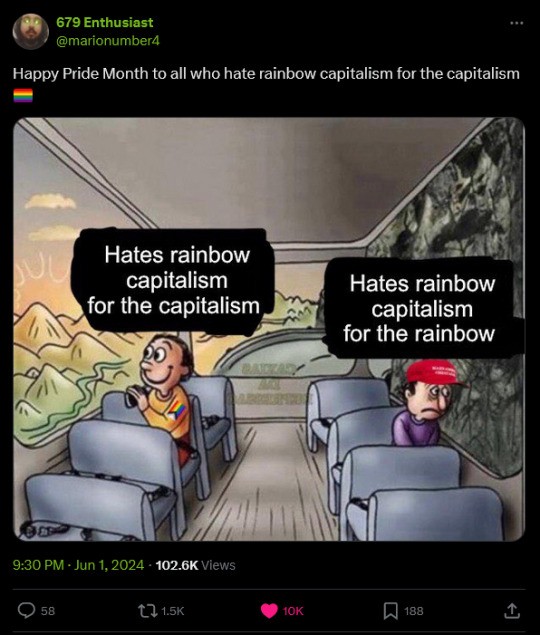
#capitalism#fuck capitalism#lgbtqia#lgbtq community#lgbt pride#lesbian#nonbinary#lgbtq#sapphic#nonbinary lesbian#late stage capitalism#anti capitalism#neoliberal capitalism#economics#end capitalism#corporations#classism#queer#gay girls#queer nsft#queer community#bisexual#queer artist
13K notes
·
View notes
Text
if your class solidarity doesn’t include people who are on SSI, food stamps, or are unable to work it’s not solidarity
35K notes
·
View notes
Text
This is a semi spinoff of this post, but really its own thought.
When a job pays less than a living wage, it generally attracts one of two types of employees:
Desperate people (usually poor and/or otherwise marginalized or with barriers to employment), who will take any job, no matter how bad, because they need the money, or
Independently wealthy people (usually well-off retirees, students being supported by their families, or women with well-off husbands*), who don't care about the pay scale because they don't need the money anyway.**
And sometimes, organizations will intentionally keep a job low-paying or non-paying with the deliberate intent of narrowing their pool to that second category.
People sometimes bring this up when discussing the salaries of elected officials -- yes, most politicians are paid more than most "regular people," but they're not paid enough to sustain the expensive lifestyle politicians have to maintain, and that's on purpose. It's not an oversight, and it's not primarily about cost-cutting. It's a deliberate barrier to ensure that only rich people can run for office.
The same is true, albeit to less severe effect, of unpaid internships -- the benefit of "hiring" an unpaid intern isn't (just) that you don't have to pay them; it's also that you can ensure that all your workers are rich, or at least middle-class.
When nonprofits brag about how little of their budget goes to "overhead" and "salaries", as if those terms were synonymous with "waste," what they're really saying is "All our employees are financially comfortable enough that they don't worry about being underpaid. Our staff has no socioeconomic diversity, and probably very little ethnic or cultural diversity." ***
This isn't a secret. I'm not blowing anything wide open here. People very openly admit that they think underpaid workers are better, because they're "not in it for the money." This is frequently cited as a reason, for example, that private school teachers are "better" than public school teachers -- they're paid less, so they're not "in it for the money," so they must be working out of the goodness of their hearts. I keep seeing these cursed ads for a pet-sitting service where the petsitters aren't paid, which is a selling point, because they're "not in it for the money."
"In it for the money" is the worst thing a worker could be, of course. Heaven forbid they be so greedy and entitled and selfish as to expect their full-time labor to enable them to pay for basic living expenses. I get this all the time as a public library worker, when I point out how underfunded and underpaid we are. "But... you're not doing it for the money, right?" And I'm supposed to laugh and say "No, no, I'd do it for free, of course!"
Except, see, I have these pesky little human needs, like food. And I can't get a cart full of groceries and explain to the cashier that I don't have any money, but I have just so much job satisfaction!
And it's gendered, of course it's gendered. The subtext of "But you're not doing it for the money, of course" is "But how much pin money do you really need, little lady? Doesn't your husband give you a proper allowance?"
Conceptually, it's just an extension of the upper-class cultural norm that "polite" (rich) people "don't talk about money" (because if you have to think about how much money you have or how much you need, you're insufficiently rich).
*Gendered language very much intentional.
**Disabled people are more likely to be in the first category (most disabled people are poor, and being disabled is expensive), but are usually talked about as if they're in the second category. We're told that disabled people sorting clothing for $1.03 an hour are "So happy to be here" and "Just want to be included," and it's not like they need the money, since, as we all know, disability benefits are ample and generous [heavy sarcasm].
***Unless, of course, they're a nonprofit whose "mission" involves "job placement," in which case what they're saying is "We exploit the poor and desperate people we're purporting to help." Either way, "We pay our employees like crap" is nothing to brag about.
4K notes
·
View notes
Text
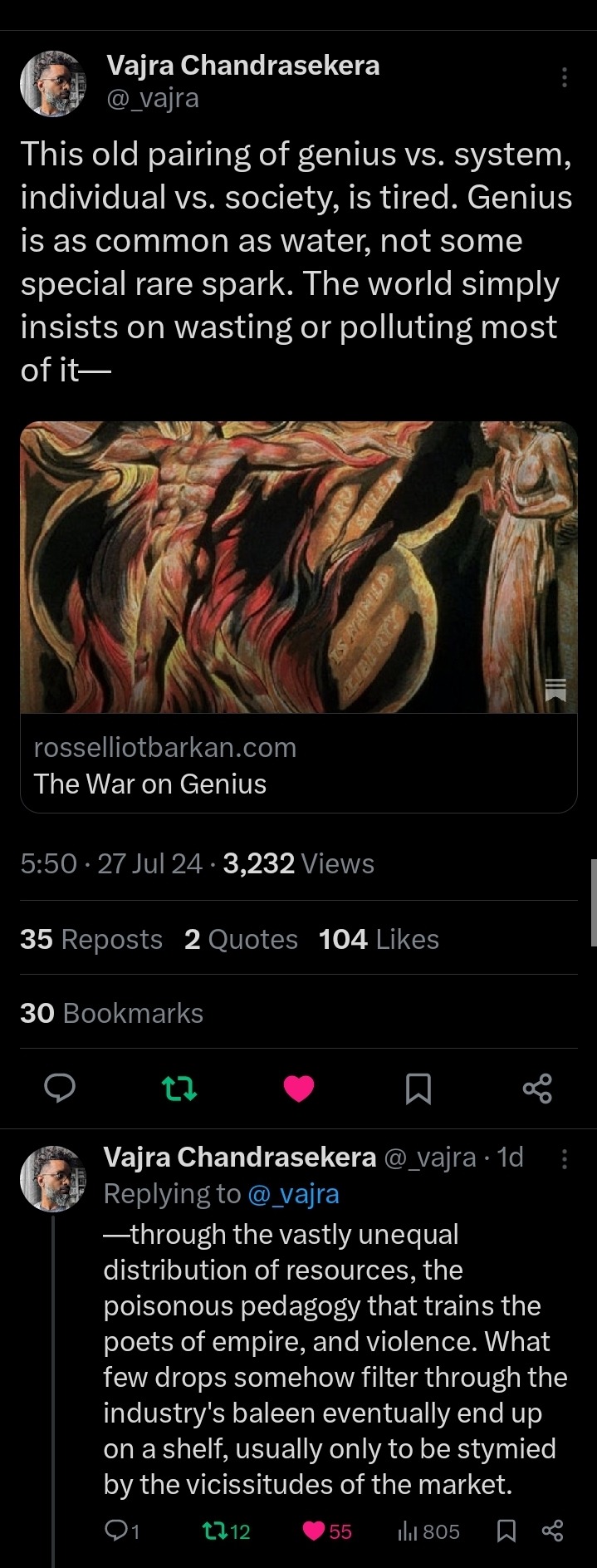
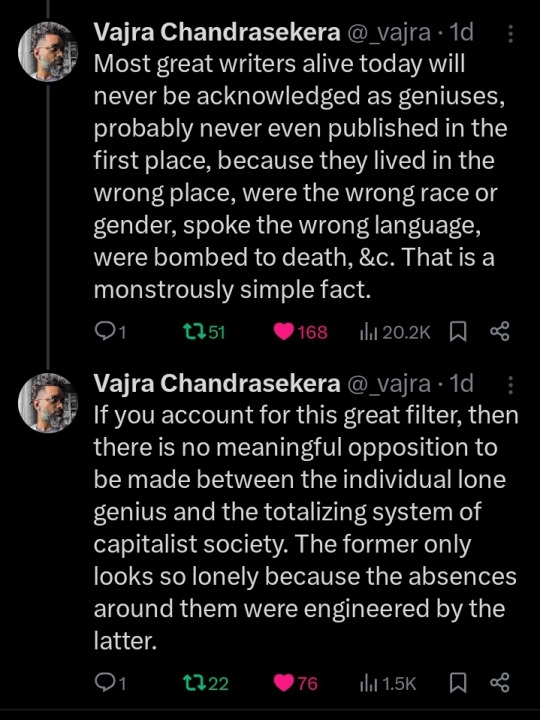
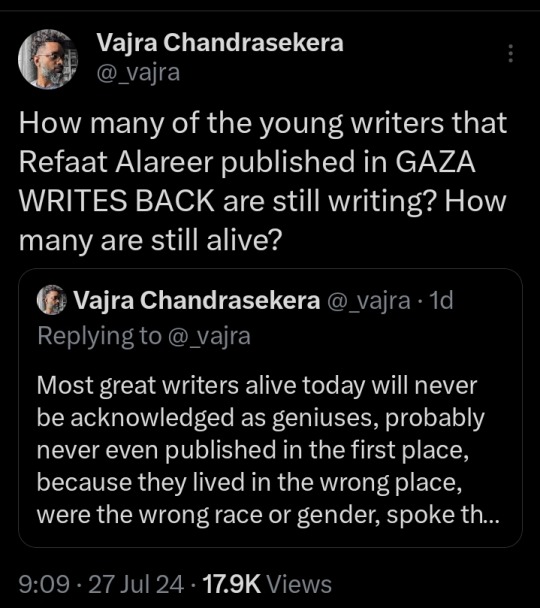
Vajra Chandrasekera is a Locus and Nebula award-winner and has been short-listed for a Hugo Award this year. You can find his Tumblr here: @adamantine and his twitter here: @_vajra
#capitalism#ableism#sexism#anti blackness#colonialism#racism#colonial capitalism#colonial violence#imperialism#poverty#global south#elitism#classism#western imperialism#colonization#gaza writes back#vajra chandrasekera#saint of bright doors#rakesfall#science fiction#genius#art#writing#literature#social justice#individualism#twitter thread#knee of huss#inequality#misogyny
5K notes
·
View notes
Text
"poor people are happier with less" and "money won't buy happiness" is literally classist propaganda. stop buying into it and start making molotov cocktails
28K notes
·
View notes
Text
so theres a lot of posts going round about the titanic wreck and the missing submarines; all of them that ive seen have made very good points about how shoddy the submersible seemed to be and how the company decided to wait eight hours before reporting it, and how this is a play stupid games, win stupid prizes for the ultra-wealthy who paid like 250grand a ticket for this thing.
but what i havent seen any posts about is how the titanic wreck is a gravesite and this tourism is disturbing the graves of over 1500 people.
sometimes its kinda hard to remember that those on the titanic were real people; it was over a century ago, the story has been romanticised in so many ways (like the movie), theres conspiracies theories galore that cloud everything with misinformation, but at the end of the day, those who died were real people.
do you want their names? heres a list of them; its a long read. and for fun, heres another site where you can see photos of the children and babies who died aboard.
their bodies are long gone and their lives long forgotten. all we have to remember them and honour them is the wreck itself. its all we have of them and it is their gravesite. its their tombstone.
caitlin doughty/ask a morticians video on the great lakes discusses the topic well, and why we should leave these shipwrecks alone because again, they are the gravesites of all the souls who died aboard those ships. we rarely have bodies to recover so we really are left just with the wreck.
and what really upsets me about titanic tourism is how the majority of those who died that night were not the ultra-wealthy rich folks you might picture when you think of ocean liners.
61% of the first class passengers survived
42% of the second class passengers survived
24% of the third class passengers survived
24% of the crew survived **
the majority of those who died that night were regular folk; not to be cliche, but they were just like us. titanics wreck is not only a gravesite for over 1500 people, its also a majority working class gravesite.
and look at us now. look at what were doing. the ultra-wealthy can pay the equivalent of peanuts to them to disturb a mass gravesite of the exact kind of people they exploit today to hold onto all their wealth.
its easy to point and laugh at these dumb idiots in their playstation controller submarine, seemingly held together with super glue and duct tape, but its also important to remember that what they were doing was simply disturbing a gravesite for fun. though the company does research, these guys werent down there to conduct research, they were there so they could brag about it to their friends. its like “climbing mount everest” while your sherpa does all the work.
if you cant tell, i have a lot of feelings about this. shipwrecks and ocean liners are one of my special interests and im currently building a (beginner’s) model of the titanic, for fucks sake. but i would never go down to see that wreck because its a fucking gravesite and we should not be disturbing their final resting place.
#kai rambles#long post#i guess?#titanic#titanic wreck#oceangate#titan#titan sub#submarine#tw death#classism#capitalism#capitalist bullshit#exploitation#mass graves#tw mass graves#shipwrecks#oceangate expeditions#stockton rush#hamish harding#tourism#i have so many thoughts on shipwrecks because there are many you can actually explore#but as far as im concerned i really dont think you should if people died when that ship sank#you wanna go explore ss america? go for it#but titanic or the fitz? no#its a gravesite and we should be respecting those who died rather than rooting around their fucking graves#im upset and angry and just you know feeling A Lot#but also if you ever need titanic facts or stuff in this realm my askbox is always open and also go check out oceanliner designs on yt#shipposting
18K notes
·
View notes
Text

20K notes
·
View notes
Text

116K notes
·
View notes
Text
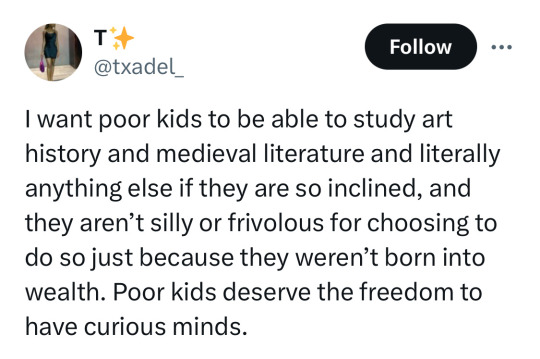
And a reminder that higher education cannot be considered truly democratised if students can still be doomed to poverty with multiple or advanced arts and Humanities degrees...
#poc dark academia#dark academia#higher education#dark academia books#dark academia blog#dark academism#studyblr#studyspo#humanities#university#college#systemic oppression#elitism#classism#artists#liberal arts#grad school#college student#education
1K notes
·
View notes